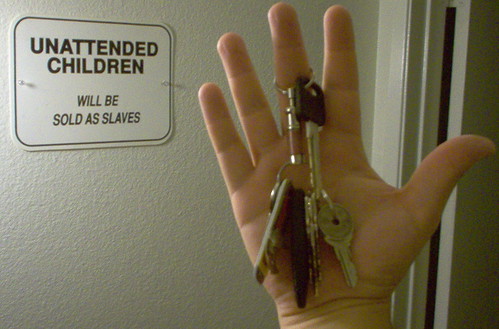“Money is power.”
It’s been a long held belief that money has too much power in our day-to-day lives, and even more so in our relationships.
Very few of us think about our relationships in terms of who the “bread winner” is and who the “home maker” is. In fact, it is far more common for both partners in a relationship to hold jobs than it is for someone to be a “stay at home.”
See, back in the day a man was defined as a provider. As the provider he was head of the household, lord of the manor, and controlled the family’s income. (He could also beat his wife too, so don’t get to nostalgic.) Woman, on the other hand, was the fairer of the sexes, she was the one that made the house a home, and who would always look her man for support (usually in the financial way). Eventually things began to change, Men were needed for wars and women named Rosie began riveting. When the men came home they found something startling, the women actually liked working. The men felt their position as providers were threatened so they forced the women to go home and play house maker.
After years of a “pretty good thing,” the men preferred their women at home; they wanted their women to ask the “big strong man” for money to buy bras (and other girls stuff).
So naturally women set their bras on fire.
Time passed again. Women became more than just things that needed caring for, they were now earning money, working on careers, and living independently (they grow up so fast…).
Now a days the nature of relationships have changed, instead of provider and provide-e, couples are now partners. As with any business partnership each person must do a give and take when it comes to power and control. Unfortunately while a business partnership can have control distributed via skills and experience, relationships don’t work the same way.
Modern day relationships face this power struggle on a daily basis. Who decides what? Who has the final word? And most importantly, how will the money be spent? Many of us don’t think about it, but really, if you are with someone (with joint banking) and they make more money than you, who’s money are you spending? Consider this scenario:
Mr. & Mrs. Smith both have jobs. Mrs. Smith earns 1/3 or what Mr. Smith does, with gas, food and so on, her pay is virtually spent on her basic living needs. When Christmas roles around and she buys a present for Mr. Smith, will she be spending her money, or his money on the present she will buy?
Now this may seem trivial in the grand scheme of relationships, but is it really? Mrs. Smith essentially has no money of her own, with her living needs consuming the majority of her pay check anything she spends beyond that amount her Mr. Smith’s. Does this mean that if an issue arises in the house that Mr. Smith’s opinion on financial issues out weighs her opinion by two thirds? Furthermore, if Mrs. Smith decided to buy something for her self (we’ll say shoes) does she has to check if it’s ok? Does Mr. Smith need to check to see if it’s ok if he buys something (we’ll say golf clubs)?
This is where the arguments come in.
“How can you spend that much on shoes?”
“What do you need new golf clubs for?”
“Where did all
my money go?”
“This is supposed to be
our money!”
“You knew she was
my sister!”
(Oh, wait, that last one was part of another diatribe…)
Of all the powers money has, one of it’s greatest is it’s influence over our independence. As humans we often define our independence by what we own and what we can do. Think back to when you first moved out (*waves hi to
Randi*), remember your first big purchase? It was probably something like a sofa or a bed, but man, what an accomplishment. You knew that this was yours. You were an adult. No one could take it away from your and make you sleep on a pile of rags in the garage (*sniffle*). Yes, your meals consisted of ramen and bologna, and you probably washed your hair with dish soap, but it was all you.
As you all know, when “I” becomes “We” there are certain freedoms that are lost, there is a lot of conflict in regards to power. There are now
two opinions on how your life will pan out, and of course, money.
The power struggle, much like a shark, exists regardless if you can see it at the surface or below. Even if each partner makes equal amounts of money, how it is spent is always an issue.
The only known solutions are either to:
(A): Devote your lives to poverty (you don’t fight over money, but you do over food)
(B): Join a cult (insert marriage joke here)
(D): Keep your accounts separate.
From these “solutions” option D provides the most mobility (not much of a future in poverty). In option D the majority of expenses can be divided evenly (think of a roommate situation), naturally the person who earns more will proportionally pay more, but for the most part there will be a balance on the expenses.
You may be thinking to your self “so how would that handle the Christmas situation?”
Well, (you cheap bastard) the Christmas situation would be modified for the economic situation with a budget in play. With the finances divided, a “gift budget” makes it where there are no awkward feelings of “you got me better gifts” or “this is all I got? You cheap prick…”
The way a gift budget would work goes as follows:
1. Both partners in the relationship decide on a fair budget. This can be done by picking an amount that each person would feel comfortable spending. $100, $200… (It’s the thought that counts)
2. Once the amount is set (let’s say $100) both partners try and buy the best present(s) they can with in the budget (no cheating!)
3. Gifts are exchanged and there are no thoughts as to who spent more (it’s safe to assume that you both spent up to the budget).
Some may say that the “gift budget” idea cheapens the idea of gift giving, but reality it embodies it. After all, the idea behind giving a gift isn’t about how much you spent; it’s about how much you care. But what messages are being exchanged if you buy your partner a watch and they buy you a car?
Money often has so much power over us that relationships seem to mold themselves around it. If we remove that power we are free to engage our selves without threat upon our (financial) independence. This does mean that some guys will have to more than just simply buy a woman’s affections, and this does mean that some women will have to pay for majority of their meals. But in the end, there will be a guideline to create a balance in the partnership that is a relationship.
Of course, there’s always the option “D,” Stay single and pay for hookers. (Money can’t buy love, but it can rent it.)
Exile
Original_exile@hotmail.com
















